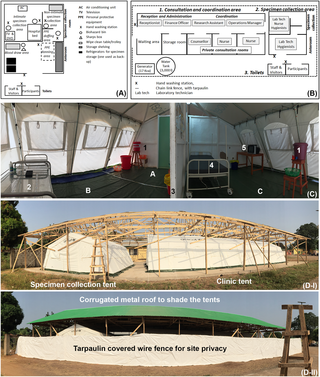PLOS Neglected Tropical Diseases ( IF 3.4 ) Pub Date : 2017-09-11 , DOI: 10.1371/journal.pntd.0005723 Gibrilla Fadlu Deen 1 , Suzanna L R McDonald 2 , Jaclyn E Marrinan 2 , Foday R Sesay 3 , Elizabeth Ervin 4 , Anna E Thorson 5 , Wenbo Xu 6, 7 , Ute Ströher 4 , Patricia Ongpin 8 , Neetu Abad 9 , Archchun Ariyarajah 2 , Tasneem Malik 10 , Hongtu Liu 6, 7 , Christine Ross 11 , Kara N Durski 12 , Philippe Gaillard 2 , Oliver Morgan 13 , Pierre Formenty 12 , Barbara Knust 4 , Nathalie Broutet 5 , Foday Sahr 3 ,

|
Background
The 2013–2016 West African Ebola virus disease epidemic was unprecedented in terms of the number of cases and survivors. Prior to this epidemic there was limited data available on the persistence of Ebola virus in survivors’ body fluids and the potential risk of transmission, including sexual transmission.
Methodology/Principal findings
Given the urgent need to determine the persistence of Ebola virus in survivors’ body fluids, an observational cohort study was designed and implemented during the epidemic response operation in Sierra Leone. This publication describes study implementation methodology and the key lessons learned. Challenges encountered during implementation included unforeseen duration of follow-up, complexity of interpreting and communicating laboratory results to survivors, and the urgency of translating research findings into public health practice. Strong community engagement helped rapidly implement the study during the epidemic. The study was conducted in two phases. The first phase was initiated within five months of initial protocol discussions and assessed persistence of Ebola virus in semen of 100 adult men. The second phase assessed the persistence of virus in multiple body fluids (semen or vaginal fluid, menstrual blood, breast milk, and urine, rectal fluid, sweat, saliva, tears), of 120 men and 120 women.
Conclusion/Significance
Data from this study informed national and global guidelines in real time and demonstrated the need to implement semen testing programs among Ebola virus disease survivors. The lessons learned and study tools developed accelerated the implementation of such programs in Ebola virus disease affected countries, and also informed studies examining persistence of Zika virus. Research is a vital component of the public health response to an epidemic of a poorly characterized disease. Adequate resources should be rapidly made available to answer critical research questions, in order to better inform response efforts.
中文翻译:

实施一项研究以检查埃博拉病毒在塞拉利昂埃博拉病毒病幸存者体液中的持久性:方法和经验教训
背景
就病例数和幸存者而言,2013-2016 年西非埃博拉病毒病流行是史无前例的。在这次流行病之前,关于埃博拉病毒在幸存者体液中的持续存在以及包括性传播在内的潜在传播风险的数据有限。
方法论/主要发现
鉴于迫切需要确定埃博拉病毒在幸存者体液中的持久性,在塞拉利昂的流行病应对行动中设计并实施了一项观察性队列研究。本出版物描述了研究实施方法和主要经验教训。实施过程中遇到的挑战包括无法预料的随访时间、向幸存者解释和传达实验室结果的复杂性以及将研究结果转化为公共卫生实践的紧迫性。强大的社区参与有助于在疫情期间迅速实施这项研究。该研究分两个阶段进行。第一阶段在最初的方案讨论后的五个月内启动,并评估了 100 名成年男性精液中埃博拉病毒的持久性。
结论/意义
该研究的数据实时为国家和全球指南提供信息,并证明有必要在埃博拉病毒病幸存者中实施精液检测计划。吸取的经验教训和开发的研究工具加速了此类计划在埃博拉病毒病影响国家的实施,并为检查寨卡病毒持续性的研究提供了信息。研究是公共卫生应对缺乏特征的疾病流行的重要组成部分。应迅速提供足够的资源来回答关键的研究问题,以便更好地为响应工作提供信息。











































 京公网安备 11010802027423号
京公网安备 11010802027423号